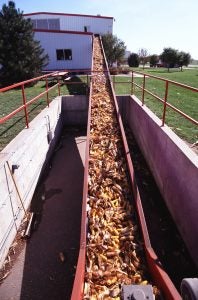 Many of us spend a considerable amount of time thinking about food – whether it’s deciding what’s for dinner or how healthy something is for our family. Given that I work on food sustainability and am married to a chef, I spend an even more extreme amount of time thinking about food.
Many of us spend a considerable amount of time thinking about food – whether it’s deciding what’s for dinner or how healthy something is for our family. Given that I work on food sustainability and am married to a chef, I spend an even more extreme amount of time thinking about food.
Last week, the Wall Street Journal hosted the first annual Global Food Forum in New York City – more proof that food and agricultural issues are increasingly on the radar screens of many executives, including those from Walmart, Campbell’s Soup, Panera, Perdue, Monsanto and many more.
I was eager to attend the event and hear the discussions among some of the most powerful food companies out there. They covered many topics including food safety, “clean” labels, biotechnology, antibiotic use and the humane treatment of animals.
All important stuff – but given the prestige of the event, I’d like to bring up the elephant in the room (or more accurately the elephant not in the room): sustainability. The environmental impacts of agriculture were barely touched upon, and considering the corporate heavyweights who were in the room, this was a missed opportunity on a massive scale.
Why? Because across the entire food production supply chain, sustainability and profitability go hand-in-hand. Consider just a few of the advantages offered by sustainable growing methods:
Increased efficiency and cost savings
Crops take up on average only 40 percent of the nutrients applied to them each growing season. The rest is susceptible to running off the field and contributing to water and air pollution.
But optimizing fertilizer use – using just the right amount and avoiding over applying – can mean higher yields and lower input costs for farmers, while simultaneously reducing that pollution-causing runoff. Having farmers be more profitable can resonate all the way up to the retailer.
Improved supply chain resiliency
 One of the biggest risks that businesses face in the coming decades is supply chain disruptions caused by climate change. Unpredictable weather events like flooding and drought can mean grain shortages or inventory losses.
One of the biggest risks that businesses face in the coming decades is supply chain disruptions caused by climate change. Unpredictable weather events like flooding and drought can mean grain shortages or inventory losses.
A couple of years ago, thousands of jobs were lost when Cargill closed meat processing plants in Wisconsin and Texas because drought had reduced its cattle count. And, according to a UC Davis study, last year saw about 542,000 acres of California farmland being left fallow for lack of water. That’s about 7 percent of the state’s irrigated farmland – meaning thousands fewer farm laborers had work.
But sustainable growing methods can help mitigate these risks. By helping farmers become more resilient, businesses are also protecting themselves by ensuring a consistent, dependable supply of goods. This improved resiliency is something shareholders are increasingly aware of.
Improved customer trust
The ability to share where and how ingredients are grown helps meet consumer demand for transparency. Consumers are clearly becoming more educated, and to remain competitive businesses need to respond to this demand.
Three recommendations for the 2017 Global Food Forum
Given all this, what advice do I have for the organizers of next year’s WSJ event?
First off, include deforestation, which is responsible for nearly 15 percent of the world’s greenhouse gases. In many tropical nations, it is more economical to cut down forests for farmland than to protect them.
In addition to taking on a massive carbon footprint, companies sourcing food from deforested land are likely exposing themselves to legal and ethical risks. Solutions exist, such as sourcing from large-scale zones that operate under an umbrella of sustainable practices, but companies need to be educated and informed about their options.
Second, shine a spotlight on corporate sustainability leaders helping make farmers more resilient and profitable, such as:
- The Midwest Row Crop Collaborative, a diverse coalition of food companies, retailers, and nonprofits working to expand on-the-ground solutions to protect air and water quality, enhance soil health, and maintain high yields throughout the Upper Mississippi River Basin.
- Land O’Lakes’ SUSTAIN® platform, co-developed by EDF, which trains agricultural retailers in best practices for fertilizer efficiency and soil health. The ag retailers then bring this knowledge to the customers they serve. Unilever, Kellogg Company, Campbell’s, and Smithfield Foods are all using SUSTAIN as a way to connect directly with growers in their sourcing regions.
Third, talk about food waste. Up to 40 percent of food in the U.S. ends up in a landfill – the equivalent of $165 billion each year. The only way to truly address the environmental issues of our food system while feeding a growing global population is to reduce food waste, which translates into improved bottom lines for farmers, food companies, and customers.
So, yes: I spend a lot of time thinking about sustainable food. But sustainability is clearly where the food industry is going.
The WSJ Global Food Forum should be thinking about it too.
This post originally appeared on EDF Business and is reprinted with permission. You may also like:
Want to bring ag sustainability to scale? Collaboration not confrontation >>
Why sustainable food can’t be a luxury >>
Why investments in agricultural carbon markets make good business sense >>









